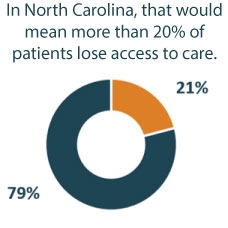For Immediate Release:
The waiting rooms at North Carolina’s Community Health Centers are hundreds of miles from the U.S. Capitol, but what happens under that dome is affecting our patients’ health.

Right now, community health centers in North Carolina are bracing for a federal funding cut of 70 percent that took effect October 1. There are 39 community health centers in North Carolina, with over 220 sites. They all serve any patient who walks in the door, regardless of ability to pay. Patients are offered sliding fee scales appropriate to their income.
On average, our NC Community Health Centers serve about 43% uninsured patients, but some individual sites have uninsured numbers as high as 90%. Some of those sites—the ones that serve the poorest and sickest in North Carolina—may be forced to close without a fix to the funding cliff.
What will happen to those people? If they get any care at all, their only option will be to go to the emergency room. That’s an expensive choice, and not the right kind of care.
NC Community Health Centers are not alone. The federal Department of Health and Human Services (HHS) itself has projected that the impact of the funding cliff will result in the closure of 2,800 health center locations, elimination of more than 50,000 jobs, and a loss of access to care for more than 9 million patients. The disruption is already evident. More than 70 percent of health centers recently surveyed said they will institute a hiring freeze, and nearly half (43 percent) say they will cut services as a result of the funding cut, according to a recent survey by the National Association of Community Health Centers (NACHC).
The irony is there is broad agreement in Congress that a cliff fix is needed and a path forward has been set. Lawmakers in the House and Senate have introduced bipartisan legislation to extend funding for health centers and other programs. But we’re up against a host of factors that include a ticking clock and a busy legislative calendar.
Why should this matter? Because health centers like ours save lives. North Carolina Community Health Centers are part of a nationwide network that started more than 50 years ago to provide quality primary care in places where doctors and services were scarce or non-existent. We are the family doctor to more than 27 million Americans in communities all over the country, 1 in 12 Americans. We provide affordable access to primary care and help reduce the incidence of chronic disease in the most challenging rural and urban communities all over America. Our patients have a more affordable option for preventive care than a hospital emergency room, a fact which allows us to generate $24 billion in health care cost savings. We are also innovators, working with community partners to respond to public health crises, such as the opioid epidemic and the recent hurricanes that struck Texas, Florida and Puerto Rico. Locally, CommWell Health has a partnership with Smithfield Foods to provide primary medical and behavioral health care for the more than 5,000 employees working at the Tar Heel processing plant. The 973,000 square foot plant was reported in 2000 to be the world’s largest, processing 32,000 pigs a day. The partnership provides CommWell Health with a state of the art primary care and behavioral health facility, located across the street from Smithfield Foods plant, open to both Smithfield Foods employees and members of the Bladen County Community.
There is little doubt that health centers have contributed significantly to cost savings for the American taxpayer. Our record of success is why our program draws bipartisan support from U.S. presidents and lawmakers. Sadly, such broad support may not be enough to help us now. The best hope for Community Health Centers right now is the CHIME bills in the Senate and the House of Representatives (currently sponsored in the House by NC Representatives Price, Rouzer, Adams, and Butterfield; no NC sponsors in Senate). There are other bills moving through the House Energy & Commerce Committee, but there is disagreement still on how to pay for these bills.
Let’s hope our leaders in Congress get legislation to reinstate health center funding – and soon.








